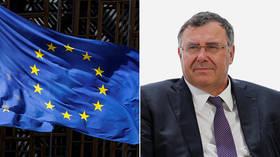EU agrees to ‘assist’ Mozambique in tackling ISIS. Here’s what it REALLY means & what role multinationals play in covert warfare
16 Oct, 2020 17:19

The European Union has announced this week its commitment to provide “security assistance” against an ISIS-backed insurgency in Mozambique. But what that means exactly is unclear.
Europe has reportedly declined to commit troops from its member states, but agreed to send personnel into the conflict zone to provide “logistics for training and technical training in several and specific areas, as well as assistance in addressing humanitarian challenges, including medical services.”
We’ve heard this language before everywhere from Syria to Yemen – this idea of military advisers heading into foreign countries only to apparently teach the local army how to do pushups and hand out bags of rice, Band-Aids, and aspirin. At most, we’re supposed to believe that they may be teaching the locals to shoot straighter, but not actually be responsible for pulling any triggers themselves.
To accept this at face value, one has to trust that mission creep is never obscured by the fog of war in conflict zones – which is a pretty naive view of war.
The move to commit Western “assistance” to Mozambique comes in the wake of its government begging for Europe’s help through the CEO of French multinational oil and gas company, Total. Earlier this month, CEO Patrick Pouyanne said in a press conference near Paris that ISIS was “settling within Mozambique” – lest anyone think that the IS fighters just went home to put their feet up and watch Netflix when they were driven out of Syria.
It’s a stunning sight to witness a business executive calling for member states of an entire continent to dive headfirst into a new foreign war – literally a war for oil, in this case. But that’s often the reality of development. Total’s investment in Mozambique’s natural gas represents the largest financing project on the African continent.
It also doesn’t sound like Pouyanne is asking for assistance from fitness trainers or shooting instructors.
It all sounds so simple in theory, this idea of developing Africa. But the real costs are often hidden from public view.
For example, Loik Le Floch-Prigent, the former CEO of French multinational, Elf Aquitaine – which merged to form Total – told me in an interview this week that intense pressure is often placed on multinationals to secure the countries in which they operate.
“Elf Aquitaine, of which I was the president, has been widely accused of making it rain and shine in Africa. It was asked to ensure stability. The stability being that the rules concerning oil and other matters don’t change nonstop with the putschs every six months. This is what was asked of me, but not only by the French government but by the American government as well.”
ALSO ON RT.COMWhite farmer’s brutal murder sends protesters & counter-protesters to rally outside courthouse in South AfricaSo when such companies are told by Western nations to do whatever it takes to tamp down insurgency and violence in the interests of protecting economically critical investments, who actually protects their assets on the ground? Who are the guys literally pulling the trigger when the company’s interests are threatened? Apparently not CrossFit instructors.
According to Le Floch-Prigent, Western multinationals can end up relying on the army of the recognized government in a country where they operate for security. However, that government’s forces can contain a mixed bag of surprises: “There are private mercenaries with weapons, but also a lot of digital mercenaries, and people who aren’t citizens of the country in question – in all African countries today. They work for the legitimate armies.”
The former oil and gas executive said that this is also the reality in Mozambique today. Apparently there’s a disconnect between Western multinationals wanting the economic benefit of development in Africa, while failing to honestly and publicly acknowledge its costs. He’s also not optimistic that Europe will make a show of sending troops to confront this new Islamic State threat.
“Europe is incapable of responding today,” he said. “It isn’t united on this subject. Europe figures that it’s helping African countries to develop, but it has to be confronted with its contradictions. You want to help? You’re not capable of fighting against the greatest peril.”
The concept of entire ecosystems of warfare quietly emerging around multinational corporations implanted in zones targeted for economic development represents a shift away from the traditional model of the nation-state representing the visible spearhead. By speaking out publicly about the challenges his company faces and calling on nation-states to back corporate ambitions, Total’s CEO has provided a glimpse of a new dynamic of covert warfare that’s likely to become increasingly common.
The statements, views and opinions expressed in this column are solely those of the author and do not necessarily represent those of RT.


0 Comments:
Post a Comment
Subscribe to Post Comments [Atom]
<< Home